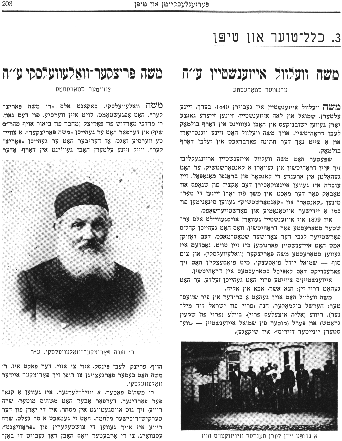
[Page 203]
3. COMMUNITY LEADERS AND PERSONALITIES
MOSHE VELVEL EISENSTEIN
First Elder
Moshe Velvel Eisenstein was born in approximately 1840. His parents, Shmuel and Leah Eisenstein, were always villagers, residing in the village of Bulmak, near Drohitichin. Prior to his marriage, young Moshe Velvel also lived in Bulmak.
Later, Moshe Velvel Eisenstein moved to Drohitchin and became an office manager; he leased the office of the vodka monopoly, and his job was to collect the liquor and tobacco excise tax for the government. Over the years, the terms office and office manager came to be considered an autonomous Jewish business. In 1879, Eisenstein was selected the first elder of Drohitchin, and his job entailed representing the Jewish community with the Czarist authorities. He remained in that position for the rest of his life, and was succeeded by Moshe Paritsker (Valevelsky), and finally by Shmuel Yudel Piasetsky, who was the last to serve in that role in Drohitchin. Eisenstein's second wife was named Zelda, and he had three sons: Khane Asher, Abba and Eliyahu.
Moshe Velvel had one brother and four sisters; Hershel Bulmaker, Chana (wife of Shmuel David Milner), Riva (Eliyahu Itsele's wife), Beila (wife of Shimon Gratch), and Perl (mother of Shmuel Eisenstein of Western United Dairies in Chicago).
[photo:] A group of Jews near Sender Vinivker's house.
MOSHE PRITSKER-VALEVELSKY
Second Elder
[photo:] R. Moshe Paritsker-Valevelsky
According to one story, Moshe Valevelsky, known as “R. Moshe Paritske,” was a descendant of R. Mordechai Mordush of Paritsk (author of a commentary on the writings of Maharam Schiff.), and was therefore called Moshe Paritsker. Another version says that he was called Paritsker because his parents lived in the village or estate of Paritsk, near Pinsk. Whatever the truth may be, the fact is that R. Moshe preferred to be called Partisker rather than Valevelsky.
R. Moshe's father, an eminent scholar, didn't earn much of a living, so his mother, Sarah Riva, became rather skillful in business. During the Turkish-Russian War, she made a lot of money. Sarah Riva was also the person who provided food products to
[Page 204]
workers building the rail line between Pinsk and Brisk (known as the Warsaw-Terespol Railway). Sarah Riva and her family traveled from one village to the next along the rail line, until they arrived in Drohitchin, where they remained. This is how Moshe Paritsker became a resident of Drohitchin.
[photo:] Cherna Paritsker-Valevelsky
When he married Cherna, his second wife, Moshe was 18 years old. His two children from his first wife, Eliyahu and Rachel, went to stay with their grandfather, Leibka (which is why Eliyahu the tavern owner became known as Eliyahu Leibkas).
[photo:] From right to left: the rabbi's wife, Miriam, Chana Beila, Cherna (mother) and Ita – wife and daughters of Moshe Paritsker, 1923. See pp. 61, 130, 135 and 223.
From the beginning, Moshe had in his home a store of produce and foodstuffs. Later he became involved in the timber business, dealing in plots of trees. Around 1890, when Elder Eisenstein of Drohitchin passed away, the community selected Moshe as Elder, and he remained in that position until 1901; he was then followed by Shmuel Yudel Piasetsky.
R. Moshe, who admired rabbis, had rabbis for sons-in-law: R. Velvel the rabbinical judge and later the rabbi of Sernik, and Rabbi Mordechai Minkovitch. Moshe spent his last years in wealth and honor. He died on the first day of Rosh Hashanah in 1914. His wife, Cherna, died a few years later. The Valevelskys had around 14 children, but only nine of them lived to adulthood: Zelig (Alex Marcus), Shmuel, Hershel, Mordechai, Miriam, Chana Beila, Ita and others.
Shmuel Yudel Piasetsky
The last Elder
Shmuel Yudel Piasetsky was born in Drohitchin in 1859 to a respected family. His father, R. Yitzchak, provided him with a traditional upbringing. Young Shmuel also acquired a worldly education. Shmuel excelled in his study of Russian. In 1901, Shmuel Yudel was selected to replace Moshe Paritsker as Elder of Drohitchin. Shmuel was re-appointed to the position every three years, and remained in the position until the Germans took over Drohitchin in 1915.
The functions of an Elder under the Russian regime were the same as those of a mayor. The Elder was the person who made decisions regarding the health conditions of the bathhouses; the firefighting department and its equipment; the roads and unpaved roads. He had make sure there was a doctor in town, and every year he had to provide the Russian authorities with a list of Jewish young men who had to enlist in the army.
Previous Page
|
Next Page
JewishGen, Inc. makes no representations regarding the accuracy of
the translation. The reader may wish to refer to the original material
for verification.
JewishGen is not responsible for inaccuracies or omissions in the original work and cannot rewrite or edit the text to correct inaccuracies and/or omissions.
Our mission is to produce a translation of the original work and we cannot verify the accuracy of statements or alter facts cited.
 Drogichin, Belarus
Drogichin, Belarus
 Yizkor Book Project
Yizkor Book Project
 JewishGen Home Page
JewishGen Home Page
Copyright © 1999-2025 by JewishGen, Inc.
Updated 13 Dec 2001 by LA